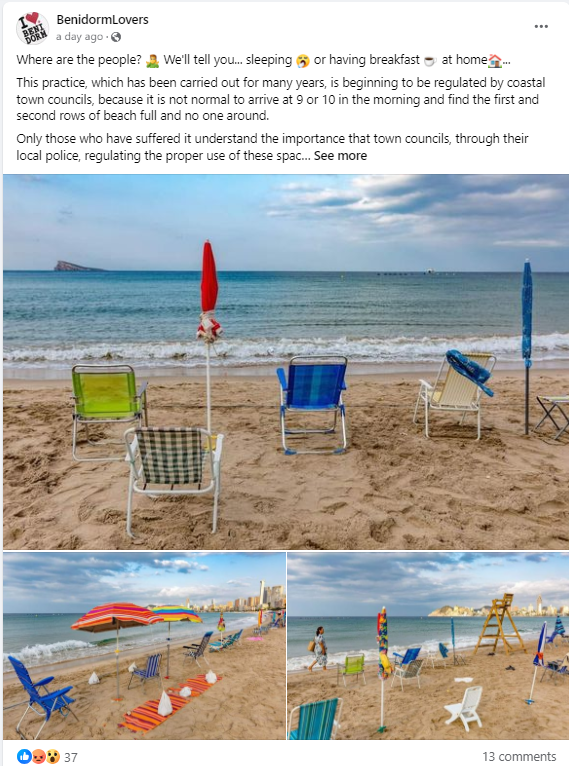Spanish Police Crack Down On Tourists Doing This One Thing On The Beach And Charges Them £210
Loungers are seized and held at the police station

Spanish authorities have begun confiscating beach loungers and umbrellas from tourists who reserve prime spots but abandon them, sometimes even before sunrise. This action addresses the issue of selfish beachgoers who hog public space.
Local governments in popular Spanish tourist destinations, including the mainland, Balearic Islands, and Canary Islands, have implemented fines for beachgoers who leave their loungers and umbrellas unattended while they are away, such as during lunch or naps.
Confiscated items are taken to the local police station, and tourists must pay a fine equivalent to £210 to reclaim them. This action complements recent efforts by Greek authorities to address the issue of beach overcrowding.
In a crackdown on businesses illegally occupying beach space with sunbeds and tables, Greece imposed over 350,000 euros in fines within just five days. Spain's new regulations are the most recent development in a series of measures aimed at tourists this summer.
Locals Push Back Against Overtourism
These actions, including widespread protests and incidents of tourists being targeted with water guns, have generated significant controversy. Demonstrators have staged protests on Majorca beaches, demanding the return of these public spaces to residents.
New regulations in coastal regions prohibit the placement of chairs, sunbeds, or umbrellas on beaches before 9 AM to facilitate daily cleaning operations. Social media posts depict Malaga police enforcing these rules by removing beach furniture.
Additional images display police vehicles loaded with seized beach chairs and umbrellas. A TikTok user expressed frustration with the situation, commenting, "You can't occupy a place on the beach while you go to have lunch, but yes, they can occupy your house," referencing Spain's controversial squatting laws.
Some individuals, however, support the new regulations. BenidormLovers, a Facebook page dedicated to Spanish tourism, commented on tourists' frustration with prioritising sleep or leisurely breakfasts over enjoying the beach.

"Where are the people? We'll tell you... sleeping or having breakfast at home. The practice of reserving beach space with chairs and umbrellas has been ongoing for years but is now being addressed by local councils, the Facebook post noted.
It is unreasonable to arrive at the beach in the morning and find the prime spots occupied without anyone present. Only those who have experienced this issue first-hand can appreciate the necessity of municipal regulations enforced by local police to ensure proper beach use, BenidormLovers wrote.
Spanish media outlets have reported that new regulations prohibit the unrestricted occupation of public land. They specifically address the practice of claiming beach space with chairs, deckchairs, and umbrellas from the early morning hours.
The Fight For Public Space In Spain's Tourist Hotspots
Local laws stipulate that umbrellas, chairs, or deckchairs left unattended for over three hours may be removed. If there is proof of the owner's absence, municipal authorities, through the local police or cleaning staff, have the right to remove these items.
For several years, local councils have received numerous complaints each summer about beachgoers reserving specific spots by leaving personal belongings unattended. Beachgoers arriving later in the morning often find prime areas occupied by items belonging to absent individuals.
Confiscated items are taken to the local police station, and owners must pay a €250 fee to retrieve them, as outlined in local regulations governing police activities, good governance, and street vending.
A protest was organised under the slogan "Enough! Let's put limits on tourism," demanding a new economic model that would decrease the number of annual tourists. Demonstrators carried signs with messages such as "Barcelona is not for sale" and "Tourists go home." Later, they resort to using water guns on tourists dining at restaurants in well-known tourist areas.
Protesters chanted, "Tourists out of our neighbourhood", as they halted in front of hotel entrances. Angry locals carrying signs swarmed a Majorca beach filled with tourists, according to a report by DailyMail.
The movement's primary concerns include Barcelona's housing costs, which have increased by 68 percent in the past decade, and the impact of tourism on local businesses and working conditions in the city of 1.6 million residents.
In 2017, Barcelona implemented a moratorium on hotel licenses and imposed restrictions on hotel rooms to mitigate the overwhelming influx of tourists. According to the property website Idealista, rents in tourist destinations like Barcelona and Madrid surged 18 percent in June compared to the previous year.
Anti-tourism protests have occurred on Majorca's beaches this summer, advocating for the return of these spaces to local residents. Over this past weekend, anti-tourism demonstrators armed with banners and placards stormed a well-known party beach on the island.
Activists have attributed rising living costs and a housing shortage for locals to the increasing number of tourists. One protester stated, "40 years ago, when I was young, I used to come here to swim, then people started coming to drink, and it has deteriorated."
Another added, "We are trying, for a moment, for a few hours, to remember that these sandbanks are the property of all Majorcans, not just tourists. We can all enjoy them, too. Many tourists understand this. It is easy to understand that the rent has doubled, that everything is full."
The battle for Spain's beloved beaches intensifies as the summer season peaks. The delicate balance between tourism, a vital economic driver, and the quality of life for residents is increasingly under strain. With tensions rising and protests escalating, the future of these iconic destinations hangs in the balance.
© Copyright IBTimes 2025. All rights reserved.






















